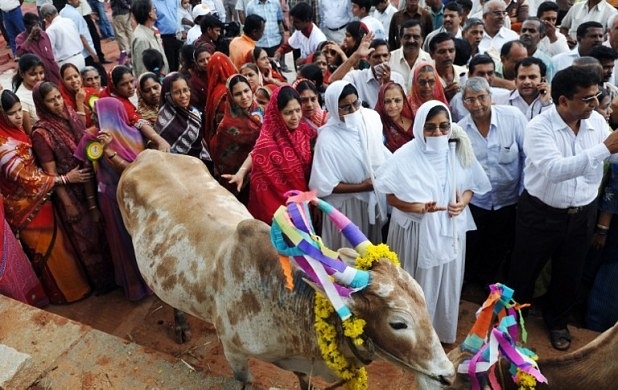
Beef Controversy: Sense And Nonsense
President Pranab Mukherjee gave his assent to the Maharashtra Animal Preservation (Amendment) Bill. This in effect outlaws the slaughter of calves and bullocks completely. Cow slaughter has been illegal in the state since 1976.
The so-called beef ban will evoke Pavlovian reactions from the usual quarters. Rhetorical dagger will be directed at the Fadnavis Government. Has not the Marxist historian D.N.Jha ‘proved’ that Vedic Brahmins sacrificed the cow and ate the meat? Did Dr.Ambedkar not argue in his book, “The Untouchables: Who Were They and Why They Became Untouchables” (1948), that the resurgent Brahminism used beef eating as a tool to suppress Dalits, who were actually those who refused to reconvert to Brahminism from Buddhism? And is not the beef ban, the consumption of which is an intrinsic part of the indigenous food culture of Dalits and Muslims, a clear manifestation of Brahminical food fascism?
Amidst the din, certain important facts tends to be be forgotten. Be it, Buddhism or Vedic religion, the overall Indic culture has been against cow slaughter. In fact, Dr. Ambedkar states that Buddhists were the first to campaign against cow slaughter:
“The Buddhists rejected … animal sacrifice, particularly of the cow. The objection to the sacrifice of the cow had taken a strong hold of the minds of the masses as they were an agricultural population and the cow was a very useful animal.”
Dr.Ambedkar further notes that ban on cow-slaughter by Gupta kings was in itself not the cause for untouchability. He asserts the refusal of Dalits to taking the carrion for meat as a symbol of social reform and rebellion against caste system.
So associating Dalit food culture with beef eating is a malicious and false propaganda.
The chief architect of Indian Constitution also recognized the civilizational rationale of cow veneration. In his PhD thesis, he stated:
“The Hindoo devotion to the Cow has been an enigma to most of the foreigners and above all has been an efficient lore in the hands of those half-baked theological failures who go to India to conduct their missionary propaganda for blackmailing the Hindoo. The origin of cow worship is as much economic as that Roman practice of not offering wine to the Gods from unpruned vines. The cow and for that matter all draft animals, is the soul of the farmers. The cow gives birth to oxen which are absolutely necessary to the cultivation of the farm. If we kill the cow for meat, we jeopardize our agricultural prosperity. With full foresight, the ancient Hindoos tabooed cow-flesh and thus prevented cow killing.”
The Directive Principle -Article 48 of the Constitution- clearly echoes this understanding of Dr.Ambedkar:
“The State shall endeavor to organise agriculture and animal husbandry on modern and scientific lines and in particular take steps for preserving and improving the breeds and prohibiting the slaughter of cows and other milch and draught cattle. “
Marvin Harris, the famous Marxist cultural anthropologist, also thought on similar lines regarding the Hindu veneration for cow. After a detailed study, he concluded: “India’s cattle complex is a positive-functioned part of a naturally selected eco-system, not a negative-functioned expression of an irrational ideology.” This has been dramatically brought about by the recent findings of National Geographic magazine. In its study of the planetary friendly consumer behavior of ordinary people from the world nations, which the magazine team conducted during 2008-2014, it consistently found the Indians performing well. India with a score of 61.4 tops the world. As the study says:
“Indians’s Greendex score has increased very considerably since 2012 and they remain in first place overall. Their Housing score has increased greatly, and their Food score has also increased. Their Transportation score has also seen a modest increase.”
In the vital area of food consumption, the six years-based study reveals that India, “has ranked first in food sustainability in every Greendex, came out far ahead again, thanks to its culturally dictated eating habits. Nearly one in four Indians is a vegetarian, and those who aren’t tend to avoid beef, the most environmentally damaging meat.“ Let us also not forget that rural India is witnessing an unprecedented depletion of cattle genetic diversity. And India has evolved some of the planet’s most well adapted cattle breeds for the tropical eco-system.
All these things should be considered before someone decries the ban as ‘Brahminical’, ‘Fascist’ etc.
However the ban should also consider the indisputable fact that beef eating has been allowed in Indian community and the marginalization of the population practicising it.
Essentially the ban on beef rests on strong cultural as well as ecological reasons. Today ecology has its own intrinsic economic value as well. That all these are in sync with Hindu ethos is just an unavoidable fact of correlation. That is also another good reason why the framers of the law should take extra-caution not to sound religious and put in caveats that distinguish beef from cow-slaughter.